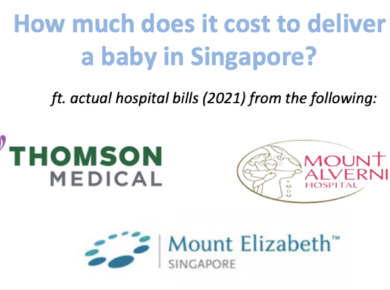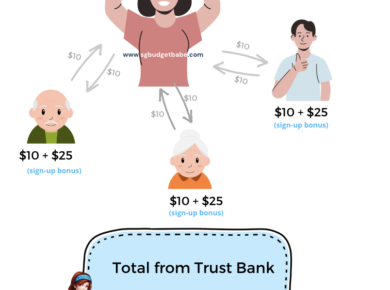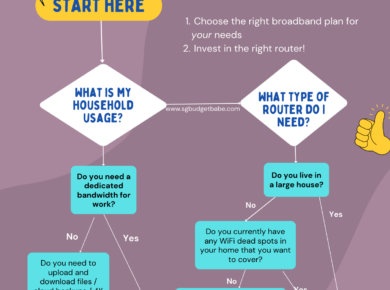During Pregnancy
What To Do In Your First Trimester
Congratulations! You’ve just discovered you’re pregnant, and you’re completely lost on what to do. Most gynaes won’t see you until you’re at least 6 – 8 weeks along, so in the meantime, here’s a helpful guide to get you started and know what to expect.
At this stage, you will also want to figure out whether to go the public or private route for your pregnancy and childbirth. Read this and understand the pros and cons of both to help you decide!
Exercising during Pregnancy
Is it safe to exercise during pregnancy? Generally, most gynaes will advise not to do anything that could “shake your womb” during the first trimester, as the pregnancy has not yet stabilised and some embryos have yet to implant securely at this stage. To avoid a miscarriage, it is best to stay off cardio and vigorous exercise for now – I only started exercising again in the second trimester once my gynae gave the green light, and this is the norm for most pregnant mothers too.
Prenatal yoga, pilates and swimming are popular options to get a good workout during your pregnancy. Speak with your gynae before starting your exercise routine. For me, I opted for this low-cost and low-impact method and did it 2 – 3 times a week! (Bonus: it helped bring down my water retention too!)
Should I be drinking maternity milk?
The jury is out on this one, but you’re a busy workaholic like me who can work until you forget to eat your meals, then you might want to know that my nutritionist and gynae actually recommended me to drink maternity milk.
Also, it is a myth that maternity milk makes you fat or causes gestational diabetes. That has not been scientifically proven, and as always, exercise common sense and drink / eat everything in moderation! I drank a cup of maternity milk as a meal replacement on my hectic days where I didn’t get time to go out and grab lunch (and I don’t have the habit of eating breakfast).
Bonus: Here’s how you can get free maternity milk to last you throughout your pregnancy!
Which hospital should I deliver in? (KKH vs. TMC vs. Mount Alvernia)
One of the major considerations of whether to deliver in a public or private hospital would be that of costs. You can get an estimate of the bill sizes across different hospitals before you decide which would be best for your budget, and I also highly recommend signing up for a hospital tour to get the vibes of the place prior to pre-booking your admission.
However, private doesn’t necessarily have to be more expensive either. You can always opt for a 4-bedder in a private hospital like Thomson Medical or Mount Alvernia, where the hospital maternity package price for a normal vaginal delivery can cost as low as $2000+. Check out the differences offered by the hospitals here as well.
Pregnant? How much should you set aside?
It is no secret that pregnancy is expensive – all the prenatal visits, screening tests, nutritional supplements, professional service fees and your actual delivery can add up to quite a substantial sum. Moreover, you’ll also have to think about getting baby items (unless you’re blessed enough to get hand-me-downs) and the cost of care. Lest you think breastfeeding is free – it isn’t, because you still need to account for costs incurred with a breastfeeding pump, milk storage bags or bottles, nutritional supplements, and more!
Should I Buy Maternity Insurance When I’m Pregnant?
What is maternity insurance? How much does it cost? What does it cover? Is it worth it? How do the different maternity insurance policies in Singapore stack up against one another?
I provide reasons on why you might want to get maternity insurance, and why you may not have to. In addition, I went under the radar as a mystery shopper to dig up details and quotes for all the maternity insurance plans in Singapore (2018 version) so that you don’t have to. Check out my comparison table here!
9 Financial Must-Dos When You’re Having A Baby
A checklist for your pregnancy and how to get yourself financially prepared. You don’t want any nasty surprises when the bills arrive, so here’s what to take note of and all the different aspects that will cost you money!
Is Cord Blood Banking Necessary?
Some people say cord blood banking is a scam. Given that it costs a few hundred dollars to store each year, I started researching and investigating to see if it was really worth the money. Having formerly studied biology and stem cells, I do understand the potential, but the key question is whether we should bank our hopes on it.
It is also a myth that cord blood banking is expensive! The results? If you can afford to go on holiday or spend on expensive tuition for your kids, you most certainly can afford to do cord blood banking. (Financial) insurance can only help you to offset the costs if anything happens in the future, but cord blood banking could serve as biological insurance and potentially treat or even save your kid’s life.
Should I store or donate my baby’s cord blood?
Some parents choose to donate their child’s cord blood to SCBB instead in hopes that if their child will ever need it one day, they’ll get priority with SCBB if the sample is still there. I debunk the myths here. Also, as it turned out, many people I know who opted for this had their donations rejected and discarded.
SCBB also offers a family banking option for if your donation is rejected, but how do the costs stack up? Well, as it turns out, it pretty much costs the same as the private banks! So don’t fall for the impression that you’ll be able to get it stored for a cheaper fee if you go down the public route – this apparently isn’t true in the cord blood banking world.
My Review of Cordlife vs. Stemcord vs. Cryoviva
After deciding that we weren’t going to donate our baby’s cord blood and would opt to store it instead, I reviewed the three private banks in Singapore to see how they stacked up against each other. The result? Cordlife was the clear winner in many ways – has the highest standards of international and local accreditation, invests in the latest technology and R&D, owns their own storage facility, highest track record of successful transplants, and more. We even visited their lab before we signed (that’s how kiasu I am) and liked what we saw, so we eventually went with storing with them.
Are Confinement Nannies Necessary?
These nannies aren’t cheap! Whether you hire a freelance nanny or from an agency, expect to pay $2,800 and up (there will also be a CNY surcharge if your baby is born then) excluding grocery costs. But are they worth it? I break down the duties of a confinement nanny, why they’re useful and what they can help you with, so you can decide for yourself if it is worth the fees you pay. Personally, we felt hiring a confinement nanny really took the stress away from us and allowed me to recuperate properly after childbirth.
How to DIY Your Own Confinement
If you decided you didn’t want to (or couldn’t afford to) hire a confinement nanny, here are ways to get by on your own!
Should I attend a course on childbirth and on how to care for my newborn?
For first-time parents, I highly recommend that you do, so that you’ll know what to expect! My husband and I went for a one-day intensive course at Thomson Parentcraft Centre and we learnt so much to help ease our worries a few weeks before I gave birth. Here’s my review of the course!
Should you book a post natal Jamu massage after birth?
It is common for many mothers to go for 7 – 10 sessions of Jamu massage after delivery in order to remove the rest of the lochia, push your uterus back up, get rid of wind and water retention, and as a result, your tummy will go down significantly after. Contrary to popular belief, my tummy did NOT deflate even after birth, and my water retention was still so bad that I had swollen feet like an elephant still. My results with Post Natal Singapore were extremely good and helped me solve those issues once and for all, even losing 10kg in the process! I’ll let the photos speak for themselves – click on the article to read more!
My Top Pregnancy Must-Haves
Items which made my pregnancy experience a whole lot easier.
Welcome to Motherhood : A Letter to the First-Time Mother
My Breastfeeding Essentials
My Childbirth Experience!
Preparing for your baby’s arrival
Understanding the Baby Bonus and CDA Benefits
Confused between both? Don’t be. Think of the Baby Bonus as a pure cash gift from the government to reward you for having a baby. You can expect to get at least $8000 over the next 18 months of your baby’s birth.
On the other hand, the Child Development Account (CDA) consists of a $3000 first-step grant (in cash) and dollar-to-dollar matching for another $3000, so that’s how you can get a total of $6000 from the government if you’re willing to make a voluntary contribution as well.
Parents with 3 or more kids can expect to get more cash gifts and grants from the government under both schemes.
Which is the BEST Child Development Account (CDA) to open?
You can only choose between POSB, OCBC and UOB. I review all of them across saving rates and perks for you to decide which is the best for you and your child.
A Comprehensive Guide to Government Grants for Newborns and Babies
The Minimalistic Baby Essentials Checklist (for a first-time mother)
It is easy to get caught up in the flurry to purchase an overwhelming number of baby stuffs as you prepare for your little one’s arrival – after all, as first-time parents we really don’t quite know what’s essential and what’s not! But don’t let the brands tell you what you need to get, as many things often end up unused and a waste of money. I sought the guidance of various mummies across social media and consolidate a minimalist checklist for you budget-conscious parents.
Also, if there’s anything else your baby needs, there’ll always be time later to buy! So keep calm and don’t overspend 😉
Save Money by Getting These Baby Must-Haves from Taobao!
Learn how to shop on Taobao and get all these nifty baby items which are great budget substitutes for many of the more expensive brands here in Singapore. Fancy Zoe Raymond’s $1,500 (sponsored) baby cot at a fraction of the price? I found it for just $200 here on Taobao!
How to Save Money in Your Newborn Baby’s First Year
Tips include claiming free product samples for you and your baby, going to public hospitals for vaccinations, getting the right insurance to protect against big financial bills, breastfeeding on demand, getting dual-function baby items and furniture, secondhand clothes, buy less toys and encourage them to play with their imagination, etc.
What Are The Top 5 Insurance Plans That You Should Get For Your Child?
Don’t get pressured into overbuying insurance for your child because of fear (this is a common tactic used by many insurance agents to get you to commit to insurance policies for your child’s future). Learn the top 5 most-bought insurance plans for children in Singapore, understand what they do and cover, and see which ones you can afford. I’ve personally ranked them in order of need and affordability here to make it easier for you to evaluate.
You and Your Baby
Claim your Baby Bonus and maximize your CDA with this hack
Did you know that all parents get at least $8000 + $3000 for each child, but learn the tricks of a financially-savvy parent and you can maximize this even further to get more than $14,000 for your newborn!






